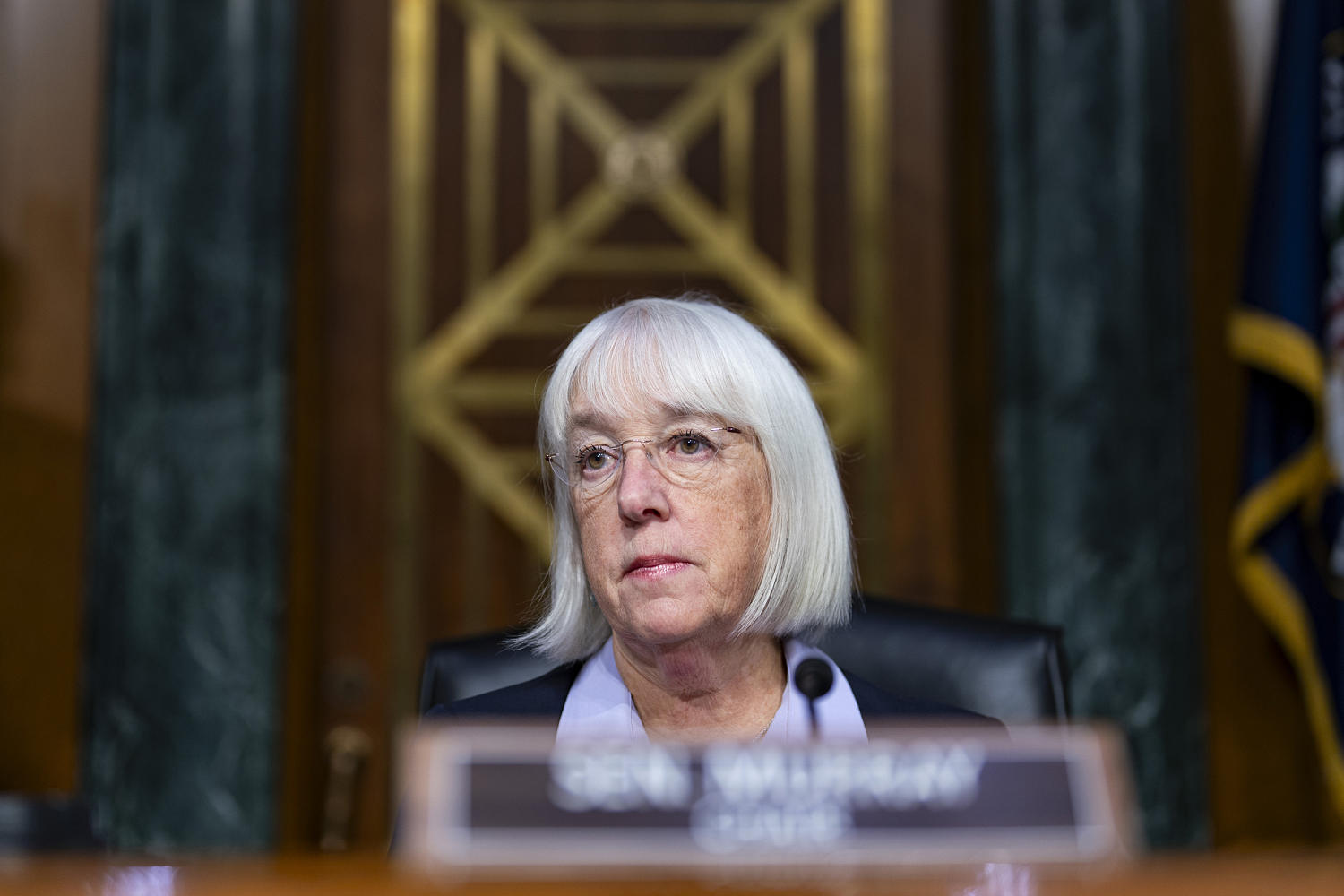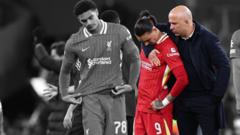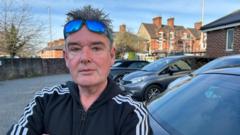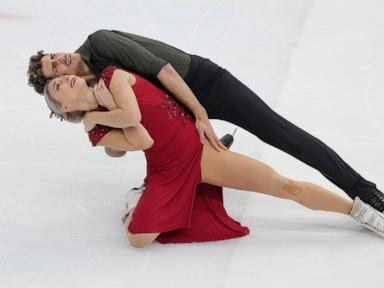
WASHINGTON, DC - MARCH 02: Max Naumov skates during the Legacy On Ice U.S. Figure Skating Benefit at Capital One Arena on March 2, 2025 in Washington, DC. (Photo by Scott Taetsch/Getty Images)
Scott Taetsch/Getty Images
On the last Sunday in January, 23-year-old figure skater Maxim (Max) Naumov finished fourth at the U.S. Figure Skating Championships in Wichita, Kansas. Naumov had placed seventh in the short program, but rose to make the four-man podium for the third consecutive year in his free skate, where he recovered from an early mistake to deliver a brilliant performance. It wasn't strong enough to make the U.S. team for the world championships this weekend in Boston -- he's the second alternate -- but it was a win of its own kind in a pressurized, dynamically athletic sport, contested while balanced and performing on sharp blades across a slippery surface. Max was happy, if not ever satisfied.
Max had been coached from toddlerhood by his parents, former Russian pair skaters Vadim Naumov and Evgenia Shishkova, who emigrated to the U.S. in 1998 and raised Max in the figure skating micro-hotbed of Simsbury, Connecticut, before the three of them moved in 2017 to join the Skating Club of Boston. But during the week in Wichita, Evgenia -- Genia to all in her orbit -- was sick with a bad cold; she made the trip largely because she would be working with some young skaters at a development camp after the competition. Both parents agreed that Max would stay away from his mother during the competition; Vadim wore a mask around Max, for further protection.
But now Max was done with his competitive work for the week. Shortly after the medal ceremony, he took part in the traditional, competition-ending gala, a closing celebration of the event. His part was two-fold: an individual performance and, later that night, the gala finale with many others. He gave his individual performance early in the show, and now had a 90-minute break until the finale. He asked his father, "Hey, can we go see Mom in the meantime?" They walked together to the parents' hotel and went up to their room. Max retold the story of that night in an interview last week with NBC Sports, for a video feature that will air Friday night during the world championships on NBC, and for this story. He sat in a tall chair, a few feet from, and facing me, in an identical chair. There were cameras, lights, and reflective screens, a crew of five and an NBC producer. One of the Boston Skating Club's three ice surfaces was visible from the room. Memorabilia surrounded us. Max wore a blue warmup from the U.S. national team.
"I got to see my mom for, it was like, about 45 minutes," Max said. "Again, very far away, because we didn't want [me] to get sick." Max is an only child, and he explains that the family was close but not outwardly emotional. That’s how it was in that hotel room. "She, in her own way, congratulated me, and you know, again, our family was very forward, so like, 'Good job, but here's what we could do next.'
"Our conversation was like that," Max said. "I sat down and talked with her for a few minutes and then my dad came over and was like, 'Hey, this is what we're doing for next season, let's talk about it.' And we spent the rest of the time, like 30, 40 minutes talking about how we can be better. What are the things we need to do in order to make the Olympic team next year? And kind of the way we're going, we have to make some changes or we won't be able to do so.
"At the end of it, when it was time to go back to the arena to do the finale, I obviously wanted to give my mom a hug," said Max. "But I couldn't because we didn't want me to get sick in case of extra opportunities in the coming days. She was laying down. I grabbed her big toe and just said, 'Hey, you know, I'll see you soon.’" Max reached out with his thumb and index finger, spread apart, and wiggled them gently around an imaginary toe. He didn't cry, but instead smiled through a squint. He is small, just 5-foot-6, and slight as most skaters are, the better to leap and spin. His features are gentle, but there is a toughness, too. You'll see.
Max went to the rink after seeing his mom, skated in the finale, and then went out with friends. His mother called him. Max described the call: "She says, 'Hey, I know we really didn't talk like this at the hotel, but I still want to let you know that we love you and you did an amazing job and we're proud of you.'" That thought hangs in the air for a beat. Then Max put it in perspective. "We just... we expressed our love differently. I love my family as much as you possibly can, and they loved me as well, unconditionally. It's just... we showed it in a different way, given our dynamic. Those words are, you know, a bit rare to hear from them... so, hearing those words outright...
"That was the last thing." Max says. "That was the last time I heard her voice." Max was on a flight home the next morning; his parents were at the rink early, working the development camp.
You know what happened next. You have known since the first word of this story. Evgenia Shishkova and Vadim Naumov were among the 67 people killed on the night of Jan 29, when a U.S. Army helicopter collided with an American Airlines jet that was en route to Reagan National Airport in Washington, D.C. (According to Gretta Bogdan, a Russian emigree and close family friend from Simsbury, and Max's godmother, Genia and Vadim were originally booked on a flight through Dallas to Boston, but changed their itinerary when the Dallas flight became delayed, to increase their chances of getting to Boston in time to make the next day's training at the club in suburban Norwood. That detail unfairly adds a layer of pain, but hurried people change flights every day, every hour; they may not have been the only ones on that plane).
Final memories of lost loved ones endure not only because of their power (although yes, that, very much), but also because of their randomness. We only sometimes get to choose our last moments, our last words -- hugs, kisses, and tears. He died peacefully, surrounded by family. But often he did not. For Max Naumov, there is a son touching his mom's toe, left exposed in a sickbed, as she might have done long ago for her newborn son. Playful and loving, between mother and child. There is a phone call, and three words rarely spoken and a little of why this time? Why this time. It's so early for Max, his parents gone just 56 days after 23 years together. Much too early.
But he has this: "It somewhat... made me a feel a little better."
The Skating Club of Boston, the family's athletic home (and more) was disproportionately harmed by the plane crash. Not just Genia and Vadim, but also young skaters Spencer Lane, 16; and Jinna Han, 13; and so excruciating that fingers resist typing it, their mothers, because sports parents go where their young athletes go.
The crash surfaced deep memories of the 1961 plane crash over Brussels that killed all 18 members of the U.S. Figure Skating team; ten of them belonged to the Skating Club of Boston, then the epicenter of skating in America. There is a memorial to those lost 64 years ago, on walls tracing the mezzanine level of the rink, faces forever young.
Now there is another memorial in a lounge across the concourse: Flowers, pictures, notes written in a child's earnest scrawl that collides with its message: WE MISS YOU GUYS! More faces forever young.

Norwood, MA - January 31: Photos of figure skaters Spencer Lane (left), coaches Evgenia Shishkova and her husband Vadim Naumov and skater Jinna Han grace a memorial table filled with sympathy flowers at The Tenley E. Albright Performance Center lobby. (Photo by John Tlumacki/The Boston Globe via Getty Images)
Boston Globe/Boston Globe via Getty Images
Some friends and family members continue to come to the rink often, to talk and to maintain friendships earned in long, cold hours together. Perhaps to see what is no longer there, as anyone would. Spencer Lane was born in South Korea and adopted as an infant by Doug and Christine. Spencer was always boundlessly athletic and energetic, but didn't connect with traditional team sports. He found figure skating at the age of 13, and pulled inspiration from all corners of the sport: From a Christmas show in his native Rhode Island to watching Olympic gold medalist Nathan Chen. His start was late for a sport in which the best often begin before they startschool, but he was rising quickly, completing all his triple jumps in two years, when many take 10. But, most importantly, the sport unlocked him. His father, now a single parent to 12-year-old Milo, holds onto that.
"Spencer found his people here, and he found his place," says Doug Lane, who we also interviewed at the Skating Club of Boston. "And regardless of how far he went with his skating, that would have been enough for us. I think, you know, arguably, most of us never find our true place that's meant for us. So that is a great comfort to me that he did find this place."
Max Naumov was one of those who started young. His parents are figure skating royalty of a kind: The classic, artistic Russian pair. They won two global titles and finished fifth at the 1992 Olympics and an agonizing fourth at the 1994 Lillehammer Games. They came to Simsbury after some other Russians: Notably Olympic gold medalists Viktor Petrenko and Oksana Baiul. (As an aside, my wife and I moved to Simsbury in 1995, raised our two children there and remain. Our son played youth and high school hockey in the rink where Russians -- and some Americans, too -- trained. Though we rarely interacted, it made this story resonate more deeply. There is no doubt I shared space with Vadim, Genia and Max, maybe in the snack bar or the lobby, not knowing our paths would someday cross again. A different kind of randomness).
Vadim was Max's primary coach; Genia was the assistant, as it were. They first tested him on ice at age three and that did not take. Two years later, they tried again. It did take. "I have some of the warmest memories of those early years," says Max. "When you teach somebody so young, you have to balance the actual training with, you know, being entertained. My father blended that perfectly when I was little." Vadim was fascinated by space and astronomy (and later, so was Max). He would divide the rink into planets, with each representing a skill, and when Max completed a skill, he would move to the next planet for something more challenging. It bonded them.
It wasn't always smooth. Parents and children never are. Coaches and athletes never are. They were both, the three of them. Roles evolved. "My mom just took a little step back and wanted to support me from the side as much as possible," says Max.

Flowers, photos and messages at a memorial at The International Skating Center of Connecticut before a moment of silence in memory of Flight AA5342, with a special tribute to Vadim Naumov and Evgenia Shishkova on Monday, Feb. 3, 2025. (Aaron Flaum/Hartford Courant/Tribune News Service via Getty Images)
Hartford Courant/TNS
Vadim delivered another message. "He was creative, he was in love with his sport, and he was also a very strong man," says Gretta Bogdan, the close family friend. Vadim guided the family with a Russian motto: Надо бороться or Nado Borotsya. "We must fight" is the formal translation. Max heard it often and translates in his own way: "It means you have to fight. Sometimes we would even laugh about it, with close friends, family. It means whatever the situation is, no matter what we were going through, whether it was skating-related or personal, whatever life throws at you, you gotta get through it, and you gotta fight through it.
"People have been saying to me, 'You're so strong,'" says Max. "I don't feel that. No matter what happened in the past, our family's mentality was always, life goes on, we move on. My dad always firmly believed in that. And my mom, she was really the same. Of course she was a bit more warm, but the message was the same."
"Of course he hurts," says Gretta. "But he is his father's son."
Max came to understand his parents' legacy in his teens. He found a bag of medals tossed into a closet in their home. "I said, 'Why are they in this bag? Why aren't they in our living room?' And they just said, 'Oh, that was our life before. We achieved and now we are onto the next things, we are here for our students and we are coaches now.' They were so humble."
On March 2, Max went back onto public ice and skated in a tribute to those lost in the crash; he dissolved in tears at the end. He will skate again Sunday in the celebratory gala at the end of this week's Worlds in Boston.
Their legacy is now mixed with his own nascent planning. What to do next? He had been helping to coach some kids at the club before his parents died, even more since. But he is still young, and still among the best competitive skaters in the world.
"The Olympic season is next season," he says. "It's what I've been working my whole life for, it's what we talked about, what we trained for. I haven't made a concrete decision yet, but the more I skate, the more the decision is becoming evident." That goal will not be easily achieved, nor is it unrealistic. Ilia Malinin is by far the best men's singles skater in the U.S., and the current world champion. But after that, there are at least a half dozen others who could earn what are expected to be two other spots on the U.S. team, and Max is one of them. He has finished fourth at the national championships in three consecutive years. One step higher and the Olympics could become reality. But 56 days ago, that step became steeper, and will always be steeper.
Of course, it is more than just an athletic quest. "I want to share their story as much as possible, because they never got the chance to," says Max. "They're not here right now, but they'll always be here. It's not just me anymore. It's our family. I have the strength of two other people with me forever."





















